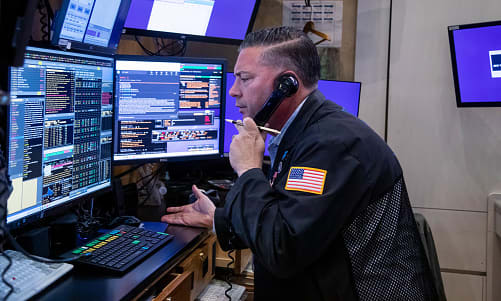Dow futures rebound by 200 points after Friday’s big sell-off as investors reassess omicron risk

Stock futures pointed to a rebound following Friday’s big sell-off, as investors monitor the latest developments related to the Covid omicron variant and assess its potential market impact.
Futures on the Dow Jones Industrial Average gained 215 points, or 0.6%. S&P 500 futures added 0.8% and Nasdaq 100 futures rose about 1%.
Stocks are coming off a holiday-shortened session Friday in which the Dow posted its worst day since October 2020. The Dow was down 905 points, or 2.5%. The S&P 500 tumbled 2.3% and the Nasdaq Composite slipped 2.2%. The three major indexes were negative for the week.
The World Health Organization on Friday labeled the omicron strain a “variant of concern.” While scientists continue to research the variant, omicron’s large number of mutations has raised alarm. Preliminary evidence suggests the strain has an increased risk of reinfection, according to the WHO. The variant was first reported to the WHO from South Africa and has been found in the U.K., Israel, Belgium, the Netherlands, Germany, Italy, Australia and Hong Kong, but not yet in the U.S. Many countries, including the U.S., moved to restrict travel from southern Africa.
The South African doctor who first raised the alarm over the new variant told the BBC that patients had “extremely mild” symptoms though it was too early to determine how omicron behaves before it is studied closely.
“While it is too early to have definitive data, early reported data suggest that the Omicron virus causes ‘mild to moderate’ symptoms (less severity) and is more transmissible,” Bill Ackman of Pershing Square Capital Management tweeted Sunday evening. “If this turns out to be true, this is bullish not bearish for markets.”
Stocks that were the hardest hit on Friday were rebounding the most on Monday.
Travel related stocks were up across the board. Carnival and Norwegian cruise lines were up more than 4% apiece in premarket trading. American, Delta and United airlines were up more than 2% each. Booking Holdings was up 2%. Boeing was up 1.7%.
“We would be aggressive buyers of this pullback,” wrote Fundstrat’s Tom Lee in a note to clients Sunday night. “As with the case for Beta and Delta variants, the ‘bark’ has proven worse than the bite in each of those precedent instances. The market carnage, in our view, will be short-lived and transitory.”
The 10-year Treasury yield rebounded back above 1.5% after a flight to safety Friday sent investors scrambling into bonds and rates lower (Prices move inversely to yields). Bank of America, American Express and other financials gained on the rebound in yields.
One stock that continued its Friday trend was Moderna. The vaccine maker’s stock was up another 10% in premarket trading after jumping 20% on Friday.
Vaccine makers have announced measures to investigate omicron with testing already underway. While it remains to be seen how omicron responds to current vaccines or whether new formulations are required, Moderna’s Chief Medical Officer Paul Burton said Sunday the vaccine maker could roll out a reformulated vaccine against the omicron variant early next year.
Wall Street’s fear gauge — the CBOE volatility index — was retreating again Monday after a 10-point spike on Friday. UBS looked at the last 17 times since 1990 when the VIX surged 10 points in a single day and found markets tended to snap back in the subsequent trading days. The S&P 500 was higher by 2.5%, on average, the next trading day and 1.6% higher, on average, over the next week, UBS found.
On top of Covid developments, investors are also anticipating key economic data released this week.
The November jobs report on Friday is expected to show solid jobs growth. Economists surveyed by Dow Jones expect 581,000 jobs added in November. The Institute of Supply Management manufacturing survey is released Wednesday and economists also expect strong results.
“The pandemic and COVID variants remain one of the biggest risks to markets, and are likely to continue to inject volatility over the next year(s). It’s hard to say at this point how lasting or impactful this latest variant will be for markets,” Keith Lerner, co-chief investment officer at Truist Advisory Services, said in a note Friday.




